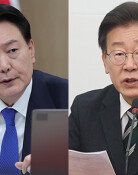Korea-Japan Free trade talks to resume in year`s 2nd half
Korea-Japan Free trade talks to resume in year`s 2nd half
Posted May. 16, 2012 06:41,
The government will resume free trade talks with Japan, which have been suspended since 2004. Seoul will likely make an official announcement on the resumption as early as the year`s latter half.
A high-ranking government official in Seoul said Tuesday, Working-level talks between the two countries held for resumption of FTA negotiations will produce an agreement soon. Chances are that the latter half of this year will see the resumption of the negotiations.
On this, a source from the Korean Trade Ministry said, If negotiations on the free trade deal with Korea aren`t resumed, Japan will seek to sign a free trade deal with China. This is Tokyos strategy. Considering that the China-Japan free trade agreement will have a negative impact on both Korea-China FTA and Korea-China-Japan FTA, we are reviewing the resumption of Korea-Japan FTA negotiations .
In Korea-China trade talks held May 2, Seoul and Beijing declared the opening of free trade negotiations and began the first round of negotiations Monday. The leaders of Korea, China and Japan held talks in Beijing Sunday and agreed to begin meetings on a proposed trilateral free trade agreement this year.
Behind Korea`s attempt to resume free trade talks with Japan in this year`s second half lies its intent to take the initiative in the pursuit of economic integration in East Asia. If Japan speeds up efforts to sign a free trade deal with China, Koreas attempt to gain the upper hand in the Chinese market though its bilateral free trade agreement with Beijing will hit a snag. In this situation, Seoul judges that the simultaneous pursuit of free trade accords with China and Japan will create leverage effects.
Koo Bon-kwan, senior researcher at Samsung Economic Research Institute, said, The pursuit of the China-Japan free trade agreement that excludes Korea is the most uncomfortable situation in the landscape of East Asia`s economic integration.
The problem, however, is that the Korea-Japan FTA does not always benefit us. The talks broke down in 2004 after Tokyo refused to budge on major issues such as the opening of the agricultural market and elimination of non-tariff barriers. Japans stance has not changed.
The leaders of Korea and Japan agreed on the early resumption of the negotiations in October last year, when they signed a currency swap agreement. But Korean President Lee Myung-bak showed reservations about the deal in March this year, saying, For full-fledged pursuit of the free trade accord with Japan, mutual interests should be at the core.
Kang In-soo, an economics professor at Sookmyung Womens University in Seoul, said, The free trade deal with Japan should be pursued over the long term, but before this, we need to reduce our trade deficit with Japan and handle Japan-specific non-tariff barriers, such as practices unfavorable to foreign companies.
january@donga.com







